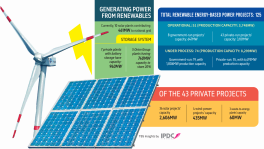US scientists invent way to turn plastic waste into jet fuel in one hour
The process proved highly efficient, converting up to 90% of plastic into liquid fuel and lubricants

US scientists have found a new way to convert the world's most popular plastic, polyethylene, into jet fuel and other liquid hydrocarbon products, introducing a new process that is more energy-efficient than existing methods and takes about an hour to complete.
The process proved highly efficient, converting up to 90% of plastic into liquid fuel and lubricants, reports The Academic Times.
In a study published Monday in Chem Catalysis, researchers outlined the process, which combined the transition metal ruthenium, utilized here as part of a catalyst, with the commonly used solvent hexane to break down polyethylene — the most commonly produced polymer, primarily used in packaging and plastic containers, such as bottles — into ingredients for jet fuel.
The study, "Deconstruction of high-density polyethylene into liquid hydrocarbon fuels and lubricants by hydrogenolysis over Ru catalyst," published 17 May in Chem Catalysis, was authored by Chuhua Jia, Shaoqu Xie, Wanli Zhang and Hongfei Lin, Washington State University; Nadia N Intan, University of Washington; Janani Sampath, Pacific Northwest National Laboratory; and Jim Pfaendtner, University of Washington and Pacific Northwest National Laboratory.
"We are quite excited that it could produce a broad spectrum of products," said Hongfei Lin, an associate professor at Washington State University, in Pullman, and the study's corresponding author, in an interview.
"We found a synergy between the solvent and the catalyst that creates a very nice combination that has lots of control knobs so that we can tune the reaction conditions and optimize the whole process," he said.
"For example, if you want to maximize the production yield of jet fuel, we can do that. And if the market has a higher demand for diesel fuel, we can also do that, and we [can] turn [it] into lubricants as well."
With plastic pollution now constituting one of the world's most urgent environmental crises, researchers across the planet are developing innovative strategies to divert plastic products from landfills and oceans or convert them into more biodegradable materials. The standard way to chemically recycle plastic is a process known as pyrolysis, or using elevated temperatures to break down the material and convert it into fuel or new plastic products. This method has been used for decades and has increasingly been investigated as a scalable technology by some of the world's largest chemical companies, according to the study's authors.
Pyrolysis could also convert plastic waste into fuel within an hour, given enough heat, Lin said, but pyrolysis generally requires temperatures exceeding 400 degrees Celsius, versus a range of 200 to 220 degrees Celsius for the new system he and his team have developed.
"We almost cut the temperature in half," he said. "The lower temperature implies that we'd input less external energy into this conversion system, and that means we could have better energy efficiency. … To achieve faster kinetics at a much lower temperature, that is a very challenging chemical engineering problem."
The researchers were surprised by the speed and efficiency of the new process, Lin said: "This is something unexpected. We looked into the literature, and lots of people reported that they had a similar process but had to spend almost 24 hours to get meaningful conversions of similar products — even at higher temperatures."
Turning waste plastic into fuel isn't a new concept. For example, researchers at Purdue University devised a method to convert the commonly used plastic polypropylene into oil. And Lin has a track record of developing innovative ways to produce jet fuel; in a previous paper, he and his colleagues demonstrated that jet fuel could be synthesized from terpenoids, a class of organic chemicals found in mint, pine, gumweed, eucalyptus and other plants.
But the new approach is especially promising not only because of the process's speed and low temperature but also because the mechanisms involved could be applied to different types of plastics. "The underlying principles can be used for expanding research for other types of polymers, not just polyethylene," Lin said.
A patent application for the new process of converting plastic waste into jet fuel is pending with the US Patent and Trademark Office, according to Rabindra Nanda, with the Office of Commercialization at Washington State University. Beyond securing approval for that patent, there's also the matter of scaling-up the technology and overcoming the logistics of introducing it in manufacturing and recycling facilities, Lin said.
"It's not a task for a chemical engineer, how to effectively connect with those waste plastics and transport them to the processing facilities," he added.
"The biggest problem with chemical recycling of plastic, especially in the United States, is that we don't have a very efficient connection system. We have trash bins in residential [areas], and recyclables are mixed with all sorts of other stuff."
Lin's research team is developing another catalytic process that breaks down polymers within mixed plastic waste, which could help reduce the enormous cost of sorting recyclables. "We want to develop a sequential catalytic process that could handle commingled plastics so we do not need to physically separate those plastics; we can go in on the molecular level and break down those polymers," he said. "We have some premier data showing this sequential conversion process is feasible."


 Keep updated, follow The Business Standard's Google news channel
Keep updated, follow The Business Standard's Google news channel















